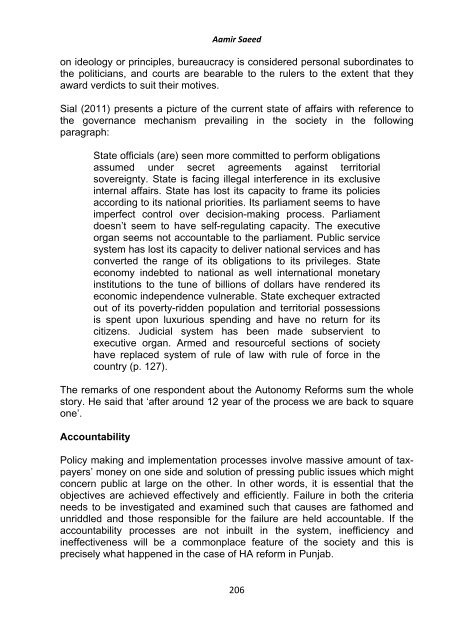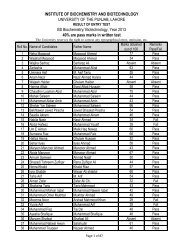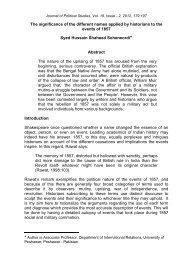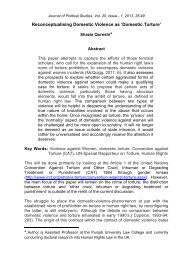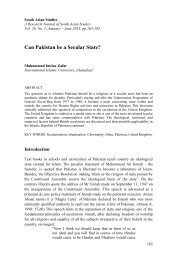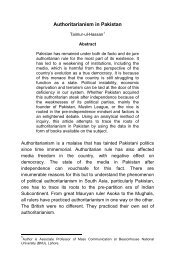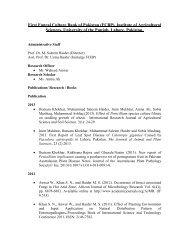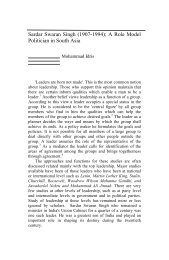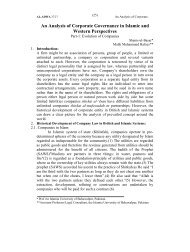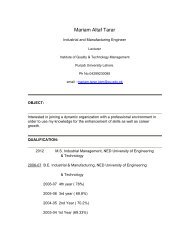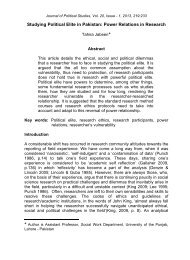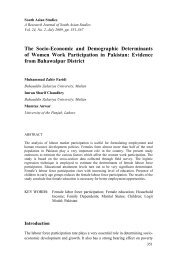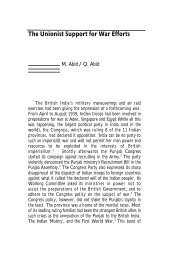Continuation of Colonial Policies by Aamir Saeed - University of the ...
Continuation of Colonial Policies by Aamir Saeed - University of the ...
Continuation of Colonial Policies by Aamir Saeed - University of the ...
Create successful ePaper yourself
Turn your PDF publications into a flip-book with our unique Google optimized e-Paper software.
<strong>Aamir</strong> <strong>Saeed</strong><br />
on ideology or principles, bureaucracy is considered personal subordinates to<br />
<strong>the</strong> politicians, and courts are bearable to <strong>the</strong> rulers to <strong>the</strong> extent that <strong>the</strong>y<br />
award verdicts to suit <strong>the</strong>ir motives.<br />
Sial (2011) presents a picture <strong>of</strong> <strong>the</strong> current state <strong>of</strong> affairs with reference to<br />
<strong>the</strong> governance mechanism prevailing in <strong>the</strong> society in <strong>the</strong> following<br />
paragraph:<br />
State <strong>of</strong>ficials (are) seen more committed to perform obligations<br />
assumed under secret agreements against territorial<br />
sovereignty. State is facing illegal interference in its exclusive<br />
internal affairs. State has lost its capacity to frame its policies<br />
according to its national priorities. Its parliament seems to have<br />
imperfect control over decision-making process. Parliament<br />
doesn’t seem to have self-regulating capacity. The executive<br />
organ seems not accountable to <strong>the</strong> parliament. Public service<br />
system has lost its capacity to deliver national services and has<br />
converted <strong>the</strong> range <strong>of</strong> its obligations to its privileges. State<br />
economy indebted to national as well international monetary<br />
institutions to <strong>the</strong> tune <strong>of</strong> billions <strong>of</strong> dollars have rendered its<br />
economic independence vulnerable. State exchequer extracted<br />
out <strong>of</strong> its poverty-ridden population and territorial possessions<br />
is spent upon luxurious spending and have no return for its<br />
citizens. Judicial system has been made subservient to<br />
executive organ. Armed and resourceful sections <strong>of</strong> society<br />
have replaced system <strong>of</strong> rule <strong>of</strong> law with rule <strong>of</strong> force in <strong>the</strong><br />
country (p. 127).<br />
The remarks <strong>of</strong> one respondent about <strong>the</strong> Autonomy Reforms sum <strong>the</strong> whole<br />
story. He said that ‘after around 12 year <strong>of</strong> <strong>the</strong> process we are back to square<br />
one’.<br />
Accountability<br />
Policy making and implementation processes involve massive amount <strong>of</strong> taxpayers’<br />
money on one side and solution <strong>of</strong> pressing public issues which might<br />
concern public at large on <strong>the</strong> o<strong>the</strong>r. In o<strong>the</strong>r words, it is essential that <strong>the</strong><br />
objectives are achieved effectively and efficiently. Failure in both <strong>the</strong> criteria<br />
needs to be investigated and examined such that causes are fathomed and<br />
unriddled and those responsible for <strong>the</strong> failure are held accountable. If <strong>the</strong><br />
accountability processes are not inbuilt in <strong>the</strong> system, inefficiency and<br />
ineffectiveness will be a commonplace feature <strong>of</strong> <strong>the</strong> society and this is<br />
precisely what happened in <strong>the</strong> case <strong>of</strong> HA reform in Punjab.<br />
206


